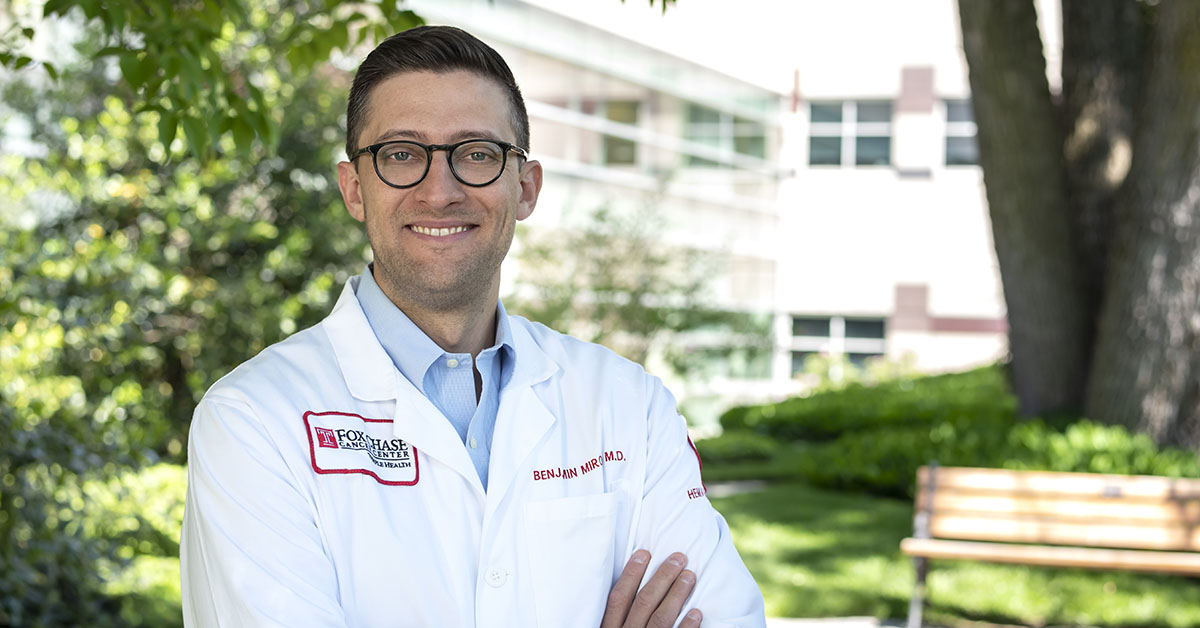
PHILADELPHIA (June 3, 2021) – In a presentation of real-world data, researchers from Fox Chase Cancer Center have concluded that the choice of first-line platinum chemotherapy did not result in a significant difference in overall survival benefit among patients with advanced bladder cancer who were able to go on to receive second-line immunotherapy.
“Over the last five years, we have seen major advances in the treatment of advanced bladder cancer with the approval of immunotherapy in the second-line and maintenance settings after treatment with platinum chemotherapy,” said Benjamin Miron, MD, a second-year hematology/oncology fellow at Fox Chase. “These new options give us this opportunity to reflect on the data we have in the first line and ask new research questions.”
Miron presented the abstract, “Influence of First-Line Chemotherapy Regimen on Survival Outcomes of Patients with Advanced Urothelial Carcinoma Who Receive Second-Line Immunotherapy,” as part of the virtual scientific program at the American Society of Clinical Oncology (ASCO) 2021 Annual Meeting.
The standard of care for first-line treatment of patients with advanced bladder cancer is either cisplatin or carboplatin, both platinum-containing chemotherapy regimens.
“Carboplatin is a modified version of cisplatin, and the changes to the molecule influence both its toxicity and also efficacy based on its ability to bind DNA,” Miron said. “In clinical practice, it has been shown that cisplatin is a more effective therapy for bladder cancer patients, but it is also more toxic and, as a result, not all patients can tolerate cisplatin well.”
The study examined whether the established efficacy benefit of first-line treatment with cisplatin compared with carboplatin remained significant among patients who went on to receive immunotherapy in the second-line setting.
Miron conducted the study with other Fox Chase colleagues, including Elizabeth Handorf, PhD, an associate professor in the Cancer Prevention and Control Program, and Daniel M. Geynisman, MD, an associate professor in the Department of Hematology/Oncology.
Using data from the nationwide Flatiron Health de-identified database, they studied 780 patients diagnosed with advanced bladder cancer who were treated with either first-line cisplatin plus gemcitabine or carboplatin plus gemcitabine and went on to receive second-line immunotherapy
“We found that survival for patients treated first with cisplatin was numerically longer than carboplatin, but the difference was not statistically significant,” Miron said.
Patients who received first-line cisplatin did have a significantly longer time to receipt of second-line immunotherapy, but there was no difference in survival time on second-line therapy between the two platinum regimens.
Recently, the Food and Drug Administration approved one immunotherapy treatment as a maintenance therapy for patients whose disease is controlled by first-line platinum chemotherapy. This treatment strategy has shown an overall survival benefit and has become the standard of care in patient who are eligible. Otherwise, immunotherapy regimens are reserved in the first line for patients who are ineligible for platinum therapy or have high PD-L1 expression and are in the second line.
Studies have shown that treatment approaches combining chemotherapy and immunotherapy or using immunotherapy alone in the first-line do not have a benefit compared with chemotherapy in patients with advanced disease.
Miron noted that because this study was retrospective, the results should not change clinical practice in any way. But, he added, “the results certainly help us quantify and better understand the magnitude of benefit of cisplatin versus carboplatin in the era of immunotherapy and potentially allow the patient and clinician to feel more comfortable about the use of carboplatin.”